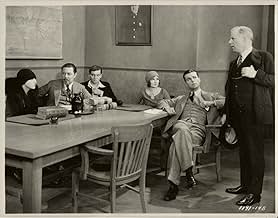Philandering actor Richard Hardell is murdered at a movie studio. His jealous wife Blanche, his director Rupert Borka, and a girl he mistreated, Helen MacDonald, all have substantial reasons... Read allPhilandering actor Richard Hardell is murdered at a movie studio. His jealous wife Blanche, his director Rupert Borka, and a girl he mistreated, Helen MacDonald, all have substantial reasons for having wanted him dead.Philandering actor Richard Hardell is murdered at a movie studio. His jealous wife Blanche, his director Rupert Borka, and a girl he mistreated, Helen MacDonald, all have substantial reasons for having wanted him dead.
- Awards
- 2 wins total
- Juror
- (uncredited)
- Grant's Secretary
- (uncredited)
- R.C. Grant
- (uncredited)
- Bill Martin
- (uncredited)
- Al Hemming
- (uncredited)
- Miss O'Brien
- (uncredited)
- Young Actor
- (uncredited)
- Bob
- (uncredited)
Storyline
Did you know
- TriviaOne of the earliest of over 700 Paramount Productions, filmed between 1929 and 1949, which were sold to MCA/Universal in 1958 for television distribution, and have been owned and controlled by MCA ever since; its earliest documented telecast took place in New York City Monday 27 June 1960 on the Movie Museum series of the Late, Late Show on WCBS (Channel 2).
- Quotes
Rupert Borka: No, no, no. That is terrible. Get up.
Richard Hardell: Well, what's the matter?
Rupert Borka: Matter? Well you cannot act. That is all. You do not feel it; you do not think it. Bah!
Richard Hardell: Want me to try again?
Rupert Borka: What for? I told you all week that you cannot act. Then I thought maybe if we came here and rehearsed here alone tonight... but it is useless. Why that dummy has more feeling than you.
Richard Hardell: Ohhh
[throws dummy out of chair and onto floor]
Richard Hardell: Now look here, Borka. Why don't you play ball? You agreed to give this part to the winner of that newspaper contest. Now didn't you?
Rupert Borka: Yes.
Richard Hardell: Yes.
Rupert Borka: Like a fool!
Richard Hardell: Oh, well you just say that because the winner was me and you've always thought I was just a rich man to hang around moving picture people.
Rupert Borka: And you are!
Richard Hardell: No, I'm not either. I've always really wanted to act. And if you weren't the director, old boy I'd be making good right now.
Rupert Borka: You are crazy. You cannot act and you will never learn to act.
- ConnectionsReferences The Benson Murder Case (1930)
Richard Hardell (Fredric March) is a man who won a contest and opportunity to star in films, but he seems to be taking that opportunity to make enemies at every turn. His director (Warner Oland) suspects him of having an affair with his wife, Hardell's wife knows he's been unfaithful in the past and is suspicious that old habits die hard, and Hardell is actually having an affair with a young ingénue, Helen MacDonald, who finds out she's just one in a string of many girls on the side after Hardell has sworn his undying love. Finally, there is Helen's brother who knows about Hardell's wicked ways and how he is using his sister.
Hardell is found dead on the set, a knife sticking out of his chest, and the question is, of course, who among the many who had motives and opportunity actually did it. Others have called this slowly paced, but I thought it moved along briskly with good performances by all. You can figure the mystery out yourself if you pay close attention to what is going on and differentiate what you know you saw versus what most people could assume they saw leading up to the murder.
The best part of this film is getting a good look at the Paramount sound stages as there are some scenes in the film that actually show an early sound film shooting in progress. One key scene is definitely a shot of a silent film in progress, another has a sound film being shot complete with the old camera booths from the early sound era. The film itself has one foot in talkies and the other in silents as the scenes in which there is conversation are completely static - courtesy of sound technology of the time. You can also clearly see that the scenes in which the camera shows any movement are silent with some sound dubbed over them. This was a common technique in 1928 and 1929 as there was no other way to include action scenes in the Vitaphone era.
I'd say the one distraction in this film is Neil Hamilton, who plays struggling studio gag writer Tony White who loves tragic figure Helen MacDonald from afar. I thought he was quite good when he played more serious dramatic roles, but here he's given the smirking wise cracking style of Lee Tracy and it just doesn't suit him.
Details
- Runtime1 hour 2 minutes
- Color
- Sound mix
Contribute to this page


























